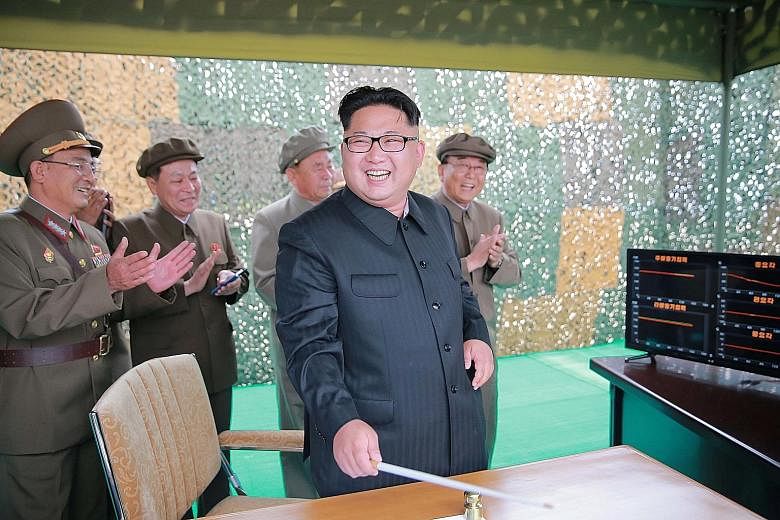SEOUL • North Korean leader Kim Jong Un threatened United States military bases across the Pacific after his country's test of a powerful new missile triggered emergency UN Security Council talks late on Wednesday on curbing Pyong- yang's nuclear programme.
Mr Kim, who personally monitored Wednesday's Musudan missile test, applauded a "great event" that significantly bolstered the North's pre-emptive nuclear attack capability, the country's official KCNA news agency reported. "We have the sure capability to attack, in an overall and practical way, the Americans in the Pacific operation theatre," he was quoted as saying.
The Musudan has a theoretical range of anywhere between 2,500km and 4,000km, with the upper estimate covering US military bases as far away as Guam.
After a string of failures in recent months, North Korea tested two Musudans on Wednesday, one of which flew 400km into the East Sea (Sea of Japan).
KCNA said the missile had been fired at a high angle to simulate its full range, and had reached a maximum height of more than 1,400km.

The test "marked an important occasion in further strengthening the nuclear attack capacity of our state", Mr Kim said.
The launch was condemned by the international community, and the UN Security Council held closed-door consultations on how best to respond.
France's deputy UN ambassador Alexis Lamek, whose country holds the council presidency, told reporters after the meeting that council members had been united in "deep concern and opposition" to the test, which was a clear violation of UN resolutions. Existing UN measures prohibit North Korea from using ballistic missile technology.
The US, Nato, Japan and South Korea denounced the test. US Defence Secretary Ashton Carter urged the expansion of missile defence systems in the region. He said: "We need to stay ahead of the threat."
Seoul and Washington are currently in talks about deploying the advanced US Thaad (terminal high-altitude air defence) missile system in South Korea - a move opposed by China.
After Pyongyang conducted a fourth nuclear test on Jan 6, followed by a long-range rocket launch on Feb 7, the Security Council adopted its most punishing sanctions yet against North Korea.
Any further measures would require the support of veto-wielding permanent council member China, traditionally the North's closest ally.
Responding to Wednesday's launch, China's foreign ministry had cautioned against "any action that may escalate tension" and called for a resumed dialogue on Pyongyang's nuclear drive.
But North Korea yesterday again ruled out returning to the negotiating table. Ms Choe Son Hui, deputy director-general of the North American affairs bureau in Pyongyang's foreign ministry, said in Beijing: "For now, we have no thoughts about taking part in talks to discuss the DPRK's denuclearisation."
DPRK stands for Democratic People's Republic of Korea, which is North Korea's official name.
Ms Choe was in the Chinese capital for an annual security forum, which includes representatives from each of the six parties. "Under these circumstances, in which the US hostile policy is still there, DPRK is not in a position to talk about denuclearisation of the Korean peninsula," she said outside the country's embassy.
AGENCE FRANCE-PRESSE

